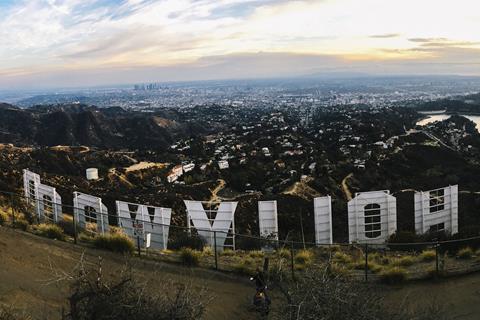
Hollywood will be holding its breath when negotiating teams from the Writers Guild of America (WGA) and Alliance of Motion Picture and Television Producers (AMPTP) begin contract talks today (March 20).
The Guild’s current contract expires on May 1 and the body has outlined a so-called “pattern of demands” it wants to see enshrined in a new basic agreement. Broadly speaking writers are calling for higher compensation – particularly with regard to residuals, now that re-runs can be such a common feature of the streaming age – increased contributions to pension and health plans, and other protections.
AMPTP negotiators, representing studios, streamers and networks in the contract talks in Sherman Oaks several miles north of Hollywood, are likely to put their foot down on the issue of residuals as it is likely to involve sharing data, something the streamers have famously been dead-set against.
Another element the Guild wants to discuss is artificial intelligence and in particular the regulation of content produced by A.I. It’s a timely topic given the high profile of chatbots like ChatGPT, which converses with users by text and can write poetry about a multitude of subjects.
The OpenAI innovation has raised concerns over the application of A.I. in storytelling and, ultimately, machines replacing human writers. In fact, OpenAI’s CEO Sam Altman has just confessed to being “a little bit scared” himself of the consequences of the technology.
Industry sources are unsure how talks will go in this area. A.I. is in its infancy in the entertainment sector and remains a nebulous topic. It will be instructive to see what both parties agree upon, if at all.
’Writers Are Not Keeping Up’
In a report out last week called ‘Writers Are Not Keeping Up’, the WGA claimed “companies have leveraged the streaming transition to underpay writers, creating more precarious, lower-paid models for writers’ work”.
It said median screenwriter pay has dropped 14% in real terms over the last five years. The Guild maintains minimum payments are set too low, noting the going rate for a first draft non-original screenplay is $60,932, “only 1.2% of the minimum budget threshold of $5 million – or 0.3% of a still-modest $20 million budget”.
The point is also made that screenwriters can wait up to nine months for payment of a first draft under $150,000 and six months for a first draft over $150,000.
The Guild has intimated entertainment companies have played up financial constraints, lay-offs and Wall Street pressure as a negotiating ploy in the run-up to contract talks.
Sources at studios and streamers say their pressures are real and reflect the changing nature of an entertainment sector where there is greater scrutiny on spending and renewed focus on the bottom line. Writers would counter that the bottom line often goes hand-in-hand with profits, and the companies need to show greater recognition for the very people without whom there would be no content.
15 years since last WGA strike
It’s been 15 years since the Guild authorised a strike that lasted 100 days from late 2007 into early 2008. While neither side wants a repeat of that scenario, the WGA is prepared for industrial action should there be no agreement on the key bargaining points.
The Guild likes to communicate and sends frequent blogs and reports to members and the press. However It is understood it will maintain a low profile for at least the first couple of weeks of talks.
Were a strike to happen – and many observers think it could come in the summer – studios, streamers and production companies would need to tread carefully on productions where scripts were written by Guild members. The issue is complicated but sources have speculated that directors, producers and line producers might make tiny tweaks to a line here or there. However without a Guild writer on set there could be no significant re-writes.
The studios and streamers have busy distribution pipelines this year and into next, and for some time executives will have been mindful of the potential pitfalls of summer 2023 productions. Not surprisingly too, it has been reported that they have been stockpiling scripts as another way of attempting to future-proof in the eventuality of industrial action.
What happens if a production brings on non-Guild writers is less clear at this stage, although it would not be hard to see a further straining of relations with the Guild were this to happen, or happen frequently.
Bringing on international writers would not necessarily provide a stop-gap either if those writers belong to International Affiliation of Writers Guilds, an umbrella group encompassing Guilds from the UK, Canada, Spain, Germany, Korea and more. These affiliates are likely to be sympathetic with the WGA’s cause.
The ramifications of a strike on TV productions would be far more serious, given how shows rely upon writing teams turning out fresh pages throughout production. Slowdowns or halts would likely arise without Guild members on hand to pen new episodes.
The Guild also wants to address the issue of “mini-rooms”, which showrunners can use for shorter periods of time and hire fewer writers than they would on a traditional writers’ room.
Unusually, the writers are going first in this year’s round of Guild contract talks. The directors (DGA) and actors (SAG-AFTRA) contracts expire on June 30 and their contract talks will follow.
The timing is significant. The WGA is a hardcore group – by early 2021 it had got its way in talks with the Hollywood agencies centred on conflicts of interest and packaging – and were it to strike, sources say that may embolden the other Guilds in their negotiations.






![The Brightest SunScreen[Courtesy HKIFF]](https://d1nslcd7m2225b.cloudfront.net/Pictures/274x183/3/5/0/1448350_thebrightestsunscreencourtesyhkiff_312678.jpg)


















No comments yet